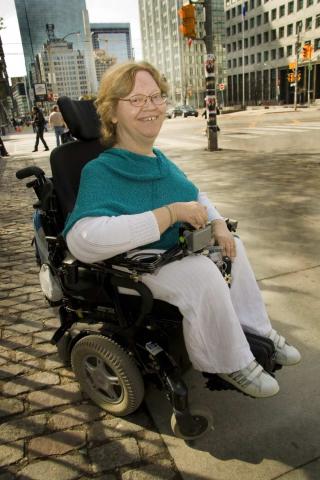For decades, we’ve counted on people to voluntarily do the right thing with regards to accessibility.

Almost 3.8 million Canadians (about 14 percent of the population) identify as having a disability. The United Church is committed to becoming an open, welcoming, and accessible church, and to affirming people of all abilities. Read the church’s response to the Accessible Canada Act.
I have lived my entire life with a disability. Growing up in the 1960s, very little was accessible: not transportation, housing, or schools—not even churches.
When I was 12, I began to question the lack of accessibility and started to push, along with many others, for needed changes to improve access for people with disabilities. Older and wiser people told me to be patient—changes would not happen overnight.
Some changes have taken place, but there is still a very long way to go before I feel I would have full accessibility on par with a person who does not have a disability. It’s very disappointing to realize that full accessibility will not happen in my lifetime, even though I started advocating for it almost 50 years ago!
On June 20, 2018, the Canadian government tabled Bill C-81, the proposed Accessible Canada Act. It was a day I had looked forward to for a long time. For decades, we’ve counted on people to voluntarily do the right thing with regards to inclusion and accessibility. That brought us only part way down the road. To finish this journey, I believe strong legislation is necessary.
Bill C-81 is the strongest federal disabilities-related legislation in Canada so far. Many individuals and organizations are already poring over the bill, now in its first reading. Upon reviewing the proposed act, I’m glad to see the emphasis on implementation and enforcement, including the plans to appoint a Chief Accessibility Officer and an Accessibility Commissioner.
Like most preliminary pieces of legislation, it has definite strengths—and areas where it could be stronger. A specific timeline for the proposed changes is not included in the bill. A central federal body that registers and follows up on accessibility complaints and ensures enforcement is also missing.
I’m hoping that subsequent versions of the bill clarify and strengthen what accessibility means to those of us on the ground. One example is airline travel, which is federally regulated. People with disabilities like me often do not view ourselves as “confined” to a wheelchair. Quite the opposite! We use a wheelchair as a necessary tool to get us from point A to point B. It liberates us!
But if I want to travel on an airplane, I’m forced to transfer out of my specially modified wheelchair (which gives me the ability to sit up unaided) into a series of increasingly narrow and painfully uncomfortable wheelchairs, and then be lifted awkwardly into an airplane seat. It’s impossible for me to use the washroom on an airplane. Also, there is a high risk that, when I arrive at my destination, I will discover my wheelchair is broken or has been sent to the wrong airport. It’s a piece of equipment I cannot live without, so this is more than just inconvenient: it’s dangerous and health-threatening.
For years, people with disabilities have pressed North American airlines to make it possible to remain in our mobility devices on an airplane. It’s safer and easier, and the technology exists to do this. So far, the proposed act does not actually require federally regulated agencies to adopt accessible practices, like having airlines incorporate seating for people in their own mobility devices (VIA Rail does this). I’m literally grounded because I cannot fly safely with the procedures currently in place.
I am not sure if this legislation would apply to national organizations like the United Church. Will there be actions the church will be required to take to become accessible? Or will the church continue as it has been—improving accessibility incrementally, out of goodwill and at its own pace? Good legislation could make this happen sooner.
If the Accessible Canada Act applies to churches like ours, it could mean the elimination of physical barriers by requiring accessible entrances to churches, their washrooms, and other church facilities. It could mean churches pay more attention to accessible communications, such as their websites, newsletters, and posters. It could mean changes in attitudes that help people with disabilities feel just as welcome and valued as any other person in their community of faith— whether in the pews or the pulpit.
It could bring us closer to a day when people with disabilities are not seen merely as objects of pity or the burden of charity. How wonderful it will be when that time comes!
—Tracy Odell is a member of Knob Hill United Church in Scarborough, ON. She will be attending General Council 43 as an observer, and is a member of the planning group for a Festival of Faith workshop entitled Disability and the Church: Re-Imagining Being Together.